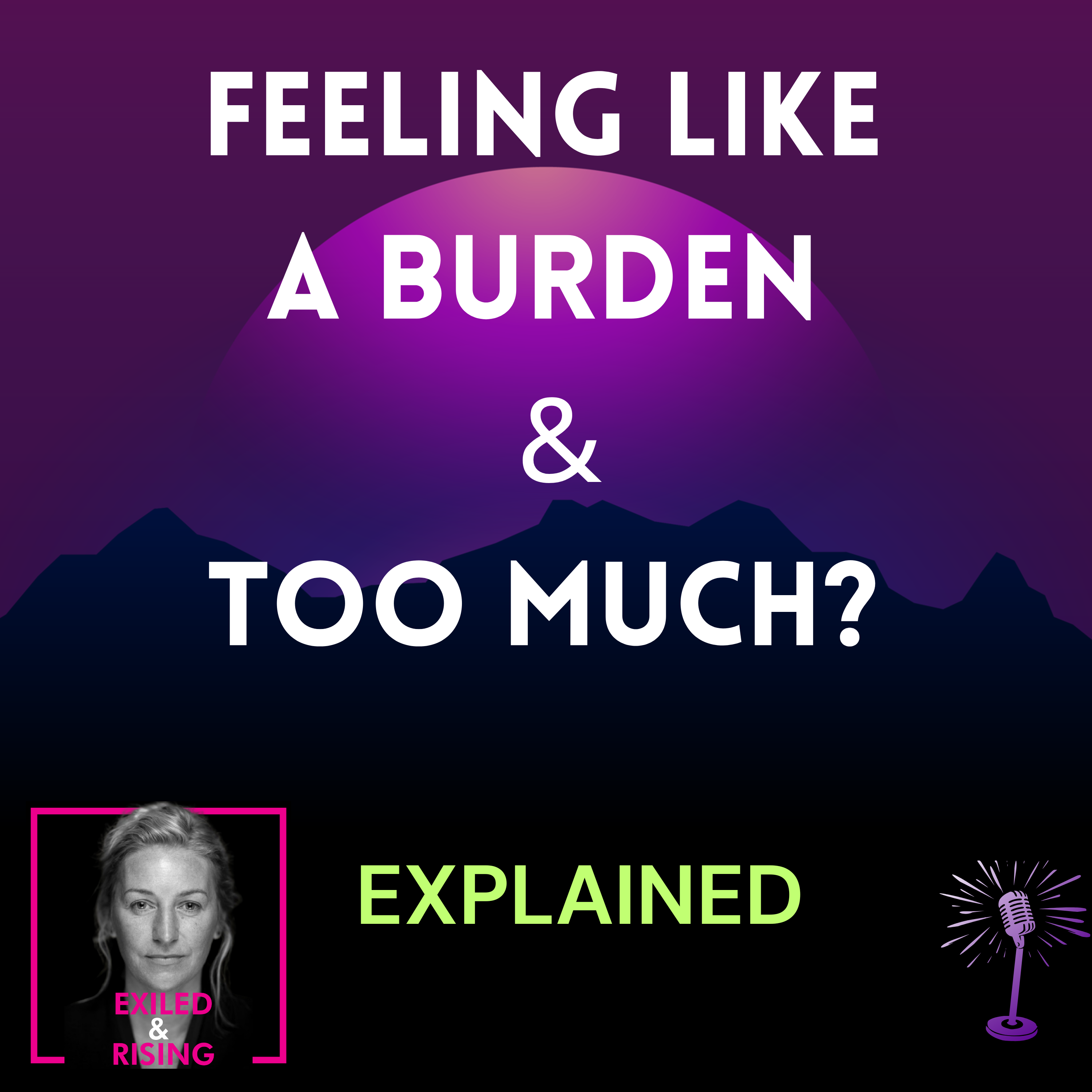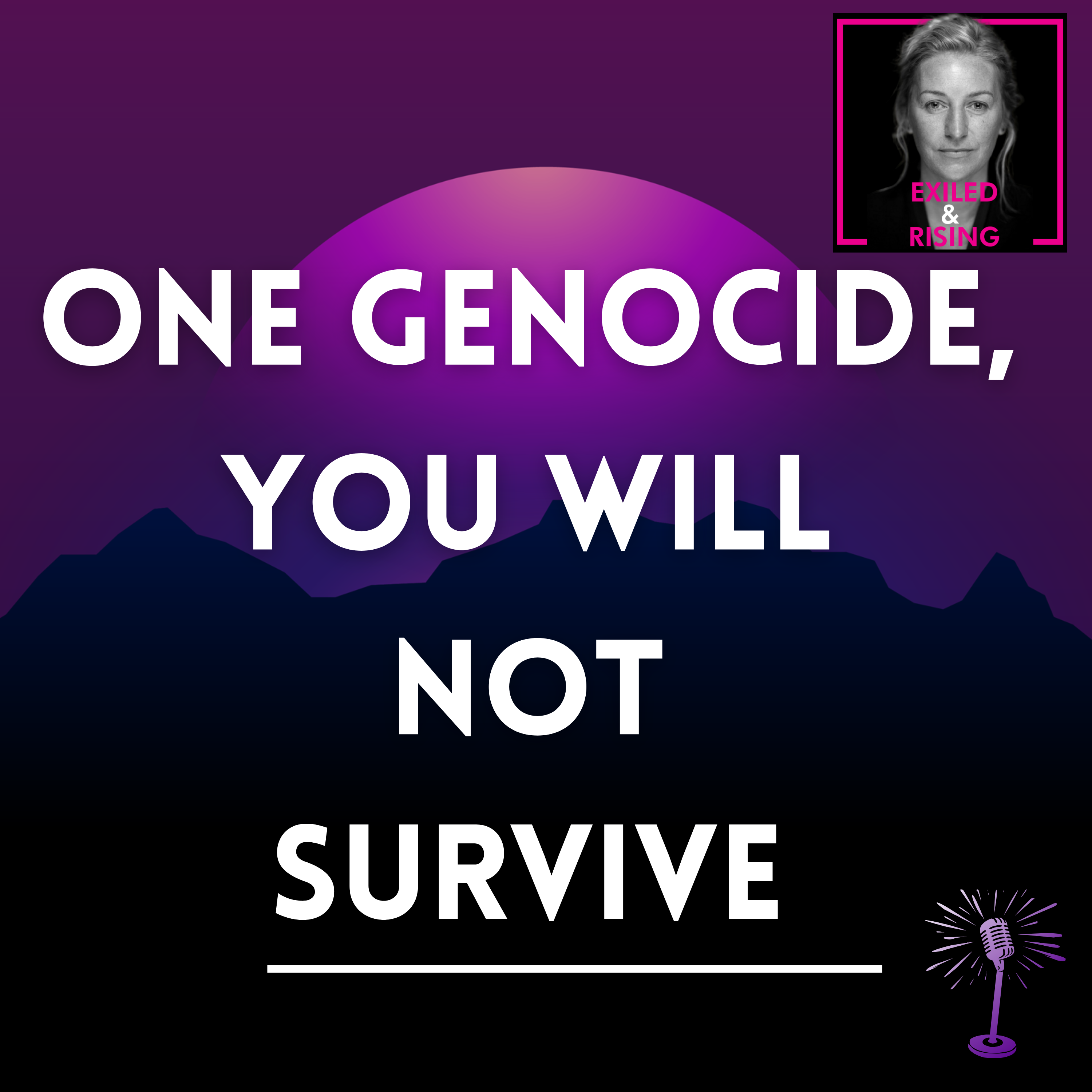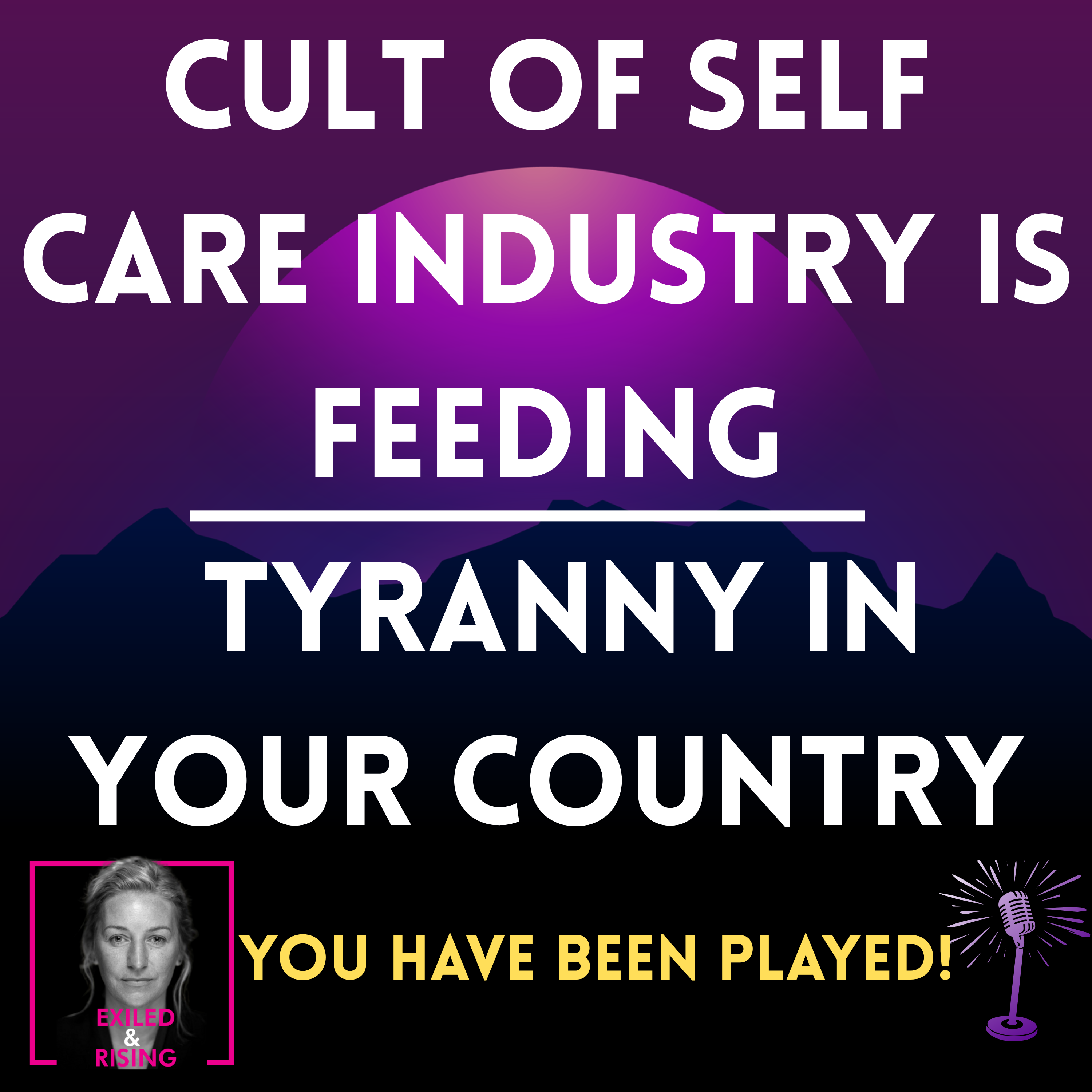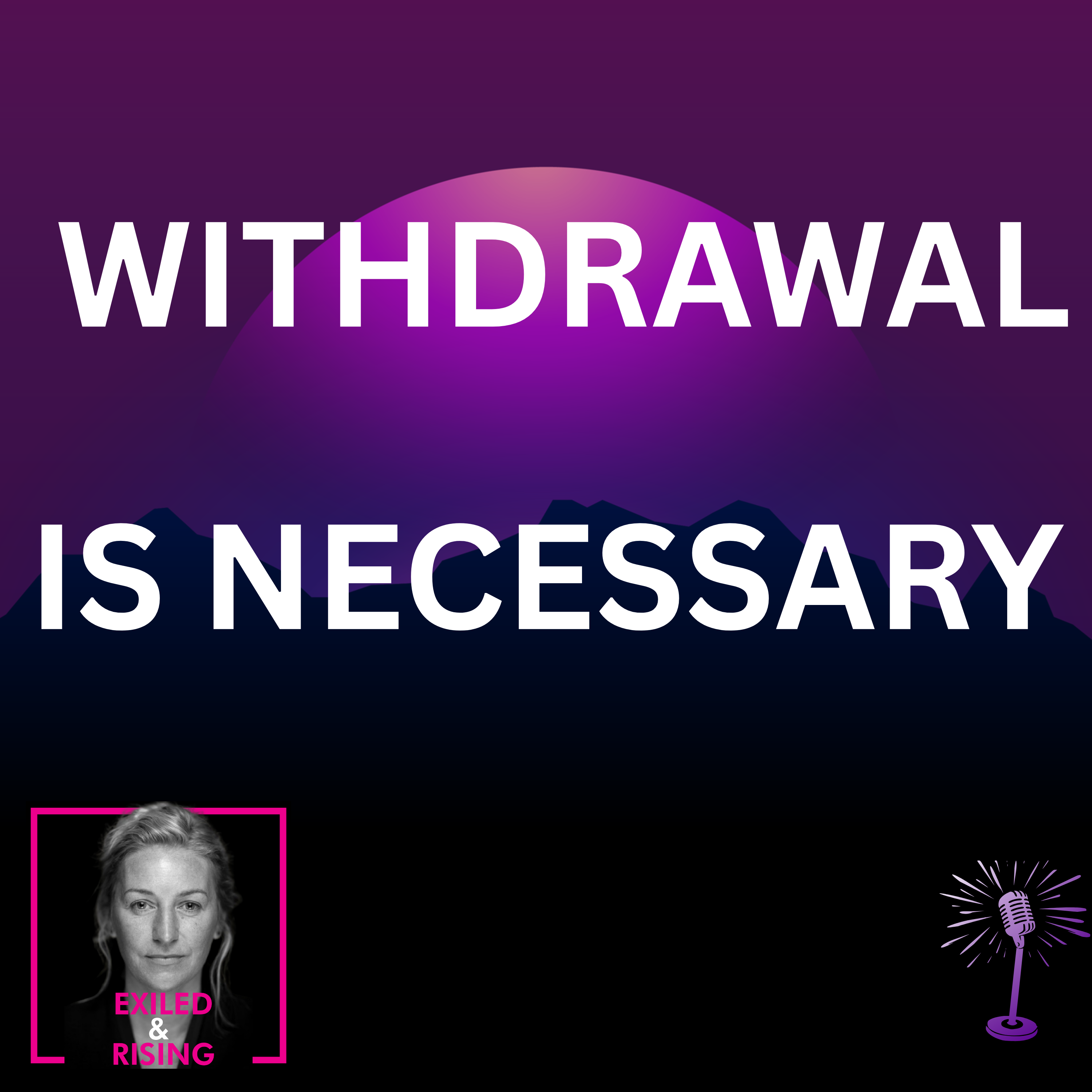Episode Transcript
[00:00:00] Welcome to Excellent Rising. I'm Anna Mail.
[00:00:04] Today I want to talk about one of the heaviest feelings we carry.
[00:00:09] The belief that you yourself are a burden.
[00:00:15] For many of us, that wound began at home, growing up in the looks, the stares, words or silence of parents who made us feel like our existence was too much.
[00:00:36] That kind of message doesn't just hurt in the moment, it takes root deep inside inner, uh, sama.
[00:00:47] Shaping how you see yourself, how you relate to others, and how you move through the world. And what is the cost of that is you might find yourself apologizing for existing or taking a space, shrinking so you don't take up the space, so you don't take up space in the workforce, in the boardroom meetings, or pushing away kindness, gentleness, softness, because you cannot trust that other person simply because you feel you don't deserve it.
[00:01:35] And this isn't weakness. This is the legacy of a burden you never signed up for.
[00:01:44] When parents who are supposed to give us safety and unconditional love make us feel like our varied existence is too much, it cuts to the core of our own essence, of our own identity.
[00:02:00] And that message, that imprint, gets carried into adulthood.
[00:02:07] Shaping how we see ourselves, how we relate to others, how we confidently taking a space, how we see ourselves as an adult.
[00:02:21] Because before we ever hear society call us too costly or unworthy, most of us first feel it at home in the tone of parents voice, in the look that says VR too much in the silence that feel like rejection.
[00:02:47] And that is where the story of being a burden begins.
[00:02:52] And um, not as an abstract idea, but as a felt experience in your body.
[00:02:59] Because your body, the body keeps the score, right?
[00:03:05] As you know, I'm somatic experiencing therapist for PTSD and trauma recovery. We know your body, your system feels first, then your mind.
[00:03:18] And you felt that even sometimes the words are not even spoken.
[00:03:24] And this is why it's so confusing for many.
[00:03:27] How come nothing was said into my face and yet I still feel as I was such a big burden for my parents.
[00:03:42] Being sick might made you feel as the biggest burden to your parents.
[00:03:51] Or, uh, being too excited, too joyful could make you feel as you were, uh, too much.
[00:03:59] It's like big burden that happiness was too much of burden, too much to cope for your parents know that your parents didn't love you.
[00:04:16] Maybe some didn't, but many parents did.
[00:04:21] But their systems, they didn't know how to regulate.
[00:04:27] Maybe they were underdeveloped in their own trauma recovery.
[00:04:34] And if that wound is, uh, left unspoken, it doesn't stay in childhood, it lives on. It follows you into adulthood, into the friendships, into the partnerships, into the work, into your meetings.
[00:04:52] And it becomes this inner voice that whispers, don't take up space, apologize again.
[00:05:00] Don't ask for too much. Don't show how happy you are, how excited you are.
[00:05:08] You might be a burden.
[00:05:10] Or hide that you are unwell and sick because you don't want to be a burden. How many people got sick and facing serious illnesses?
[00:05:27] And they're hiding.
[00:05:29] They're hiding because they don't want to be a burden.
[00:05:34] How many?
[00:05:39] So this is where I want to start by naming how that family story plants this seed and how it grows if you never get the chance to return it.
[00:05:52] So let's begin.
[00:05:54] I'm reading from my book, the trauma we don't talk about.
[00:05:58] This is page 23, and peace is called the burden you didn't sign up for.
[00:06:05] Let's begin.
[00:06:10] The burden you didn't sign up for.
[00:06:14] Believing you're a burden to your parents, who are supposed to provide you safety, Unconditional love and protection is a, uh, deeply felt, visceral rejection.
[00:06:30] It is tremendously painful.
[00:06:34] You can feel it on a cellular level throughout your entire body.
[00:06:43] When you experience that same rejection by others later in life, it can make you feel as if you're unworthy of belonging, of being loved, of being embraced and accepted, and even unworthy of existing in this world.
[00:07:10] If, as a child you were made to feel like you were a burden, you will likely carry that pain and project into your future relationships.
[00:07:23] It will feel like a constant weight carried throughout your life, no matter your age, that propels you to search the faces of everyone you meet, scanning to see if you're, uh, unwanted.
[00:07:45] If your perception tells you that you're a burden, it catapults you into the same state of rejection, isolation, unworthiness, and and shame.
[00:08:00] It is a core feeling that tells you that you don't deserve better because you witnessed how your existence burdened your parents.
[00:08:17] It is traumatic to feel this way and can cause you to constantly apologize throughout your life or be unable to accept kindness from others.
[00:08:35] Feeling like a burden made you believe you were undeserving of love and kindness, which made you doubt your place in the world.
[00:08:51] In truth, you are deserving of goodness.
[00:09:00] Despite all that you went through, you deserve kindness, belonging, unconditional love, and the space to expand.
[00:09:17] You are deserving and worthy of it all.
[00:09:25] And with good therapy and by working on yourself one step at a time, you will be able to heal the wound of feeling like a burden to others.
[00:09:51] So let's take a pose here.
[00:09:56] You can take a piece of paper and pen, and we will go into the teachings of this piece.
[00:10:02] So what's behind of this piece?
[00:10:11] When you were made to feel like a burden as a child, it wasn't just a passing moment of hurt.
[00:10:18] It was a core message that attached itself to your identity, to your essence, to your sense of who you are.
[00:10:29] When you're walking, when you're talking, when you're expressing your joy, when you feel sick, when you feel sad, when you feel happy.
[00:10:44] It attaches to every single expression and state of you.
[00:10:50] And what that taught you is you are unworthy of belonging, of being embraced, of being loved in any state of expression of yourself.
[00:11:07] It's a deep, deep, deep wounding.
[00:11:13] And that's not something you can shed off when you move into adulthood so easily.
[00:11:21] Because it's sticky, it gets to the core of our own being.
[00:11:27] And because you learned this at the time when your sense of self was still forming, it becomes part of the way you understood who you were.
[00:11:40] And here is the thing.
[00:11:42] When that early wound isn't healed, it doesn't stay in the past, right?
[00:11:51] So you carry it with you. It feels like a burden. So what's very common, you find yourself scanning the faces of everyone you meet, looking for signs that they don't want you.
[00:12:09] It's almost like you are anticipating that person will drop me now.
[00:12:21] It's constantly scanning and detecting on your partner face, on your colleague face, the moment, the moment you will say, ha. Huh. I know it. I know.
[00:12:39] Here it comes.
[00:12:41] I'm a burden again.
[00:12:44] I, um, am too much again.
[00:12:46] And that's the state where they live in for a very, very long time. That's deep wound.
[00:12:56] And also, you might find it almost impossible to receive kindness because it doesn't fit the story you were taught about yourself.
[00:13:10] And not only thought, you clearly experience that.
[00:13:21] Not receiving enough kindness, not receiving enough softness, not receiving enough respect, not receiving enough gentleness. So what gets to be robbed from you is feeling the state of safety with someone without this cautious, alert state of anticipating on their face the sign that you're a burden to them.
[00:13:56] And also, when your partner, your friend, anyone, express something kind to you, it's m. Immediate rejection.
[00:14:09] And it's awful thing to live like that. It, uh, truly, it's very lonely.
[00:14:14] And what is not just for you is also not just for that person.
[00:14:22] Because ask yourself how many times, how many times you actually rejected that someone who was very genuine, kind, human, you robbed yourself of that relationship, of that someone's kindness and love in the moment or for a long. You put them in the same box as your parents.
[00:15:04] You didn't even give them a chance.
[00:15:08] You deprived yourself and m also you deprived them to share the love the same way your parents deprived you of sharing your love, sharing your joy, sharing your excitement, sharing your softness, sharing your humanity.
[00:15:36] The same way now you're depriving maybe a partner, maybe a friend, maybe your child, maybe your neighbor to express that love and joy and kindness and respect in relation with you.
[00:16:04] And that's not fair, right?
[00:16:07] It's not fair. It's not just.
[00:16:12] You're repeating the same pattern, right?
[00:16:18] And this is what trauma does.
[00:16:21] It wires your nervous system to expect rejection and to guard against being too visible, too needy, too human.
[00:16:36] It makes you shrink yourself before anyone else can.
[00:16:41] And guess what?
[00:16:43] You are doing the same to the person who is next to you, who is being visible and needy and human, right? And that's exhausting.
[00:16:59] It takes so much energy and your life force from your nervous system.
[00:17:03] And what the truth is, as an adult, you are allowed to release that burden. You don't need anyone permission.
[00:17:15] You don't.
[00:17:16] You don't have to carry the shame of your parents conditioning.
[00:17:24] So how you can begin to learn how to receive this kindness, right? You can start practicing saying yes when someone offers care without apologizing, without pushing away. And it will be very hard.
[00:17:43] So if you would like, I'm running the lesson on this piece.
[00:17:49] How to let go of the sense of burden and how to open up ourselves to receive someone else love and kindness before a nervous system kicks in, which will be very rapid and quick to inhibit the sense of expansion, right?
[00:18:12] It takes rewiring, it takes practice. So this is what we'll do.
[00:18:18] Check the links and you can sign up. The links are in the show notes below. But so this projection into relationships, this childhood script, which was the truth, right? I'm a burden becomes a template for later life.
[00:18:35] Misreading neutral gestures as a rejection or positive gestures as a possibility that you will be shamed, avoiding reciprocity or subconsciously self sabotaging intimacy.
[00:19:01] So why many relationships fails is because of this wound. What's very common is also self policing and shame loop.
[00:19:14] Because this feeling as a burden creates compulsive apologizing.
[00:19:23] Whatever you say, whatever you do is coupled with this need. Oh, uh, let me just apologize ahead of time so I don't feel like a burden.
[00:19:37] Rejecting gifts and kindness.
[00:19:41] And also what's very Common is moving into the relationships that replicate this original dynamic.
[00:19:51] Right. So what we need to learn here, uh, that shift is possible from blame as self to blame as given or burden as self as me, I'm a burden to burden as given. It's given, it's not yours.
[00:20:17] Also, the sense of burden is not only cultivated in a family, in a family system, it often begins in a childhood, right, When a parent makes you feel like your very existence was too much.
[00:20:37] But that script doesn't come out of nowhere.
[00:20:42] So let's go into bigger landscape here it sits inside larger cultural and political narratives about who is allowed to belong, who is not a burden, who is welcomed and who is told they cost too much.
[00:21:04] So think about this.
[00:21:06] In this productivity driven culture, we are taught that worth is measured by achievement, by amount of money you're making, success.
[00:21:26] And if you can't constantly perform or prove your value, right, the messages that you are taking up space you don't deserve, it's out there. Just look at the social media, look at the news.
[00:21:46] What's placed on us, what's placed on you.
[00:21:51] And for many people, if you're exiled, if you're a person with disability, if you're coming from marginalized communities, if you're undocumented, if you're an immigrant, if you're a refugee, if you're a lower income status, the world says outright, you're a burden on our systems, our resources, our society.
[00:22:18] So think about this, what happens in the family unit, families absorb those beliefs, often without even realizing it.
[00:22:31] Our nervous system, we can absolutely receive that unspoken and clearly spoken frequency.
[00:22:40] We absorb our systems, our bodies are so highly absorbent.
[00:22:48] And what do we do with this? We pass this down.
[00:22:54] And a child who grows up being told at home that they are too much is primed to hear the same story out in the world.
[00:23:06] And then when this society devalues your identity, that wound reinforced again, again.
[00:23:18] So think if you live in disabled body, if you're facing many health issues, most likely you saw on your parents face as you are a burden, not because they didn't love you, but the quality of living was this constant anxiety. And clearly it could be as a burden.
[00:23:48] And then you go out into society and then on top of that that wound gets reinforced.
[00:23:59] Because now you're a burden to our resources, to our system.
[00:24:10] If you're child of an immigrant, if you are immigrant, you know that if you're displaced, how many times you heard that you are a burden on the system, on everyone, resources, right?
[00:24:35] So why healing this burden wound is not just about the therapy or self work.
[00:24:42] It also is a political act of resistance.
[00:24:46] When you choose to stop apologizing for existing, for your identity, for your being.
[00:25:00] And also when you begin to accept kindness, when you claim your right to take up space.
[00:25:09] You're refusing the family story and the cultural story at the same time.
[00:25:15] You're saying, I'm not a, uh, burden. My existence is not too costly. I belong here.
[00:25:21] I belong here by living by my moral compass, by my moral values, by my kindness, by my reciprocity to the community, by my care, by my intelligence, by my stories, by my being.
[00:25:45] And if there is one message I want you to take from today is this.
[00:25:51] Feeling like a burden was never your truth.
[00:25:56] It was given.
[00:26:00] It wasn't born out of your essence.
[00:26:06] It was a wound given to you.
[00:26:10] And the fact that you carry it says nothing about your value.
[00:26:18] You are deserving of goodness and not deserving. In a sense, you need to work hard to receive goodness.
[00:26:29] Now. You have right to receive goodness, to receive kindness as you are giving back your goodness and giving back your kindness, or trying maybe for today, maybe from today, to give back that goodness and kindness you see in someone's face, in someone's gesture, before you police them and place them into the box with the people to whom you have been a burden, give them that grace, place them in that new chapter of your lives and open yourself up to receive that.
[00:27:26] Don't deprive people of sharing their goodness and kindness towards you as, uh, you are sharing your goodness and kindness.
[00:27:39] And you know the wound when you were deprived of sharing your existence, of sharing your love, your joy, your happiness, your sadness, or being fragile and sick, Right?
[00:27:59] If this episode resonated with you, share it with someone who may need to hear it.
[00:28:07] And remember, you were never meant to to carry that burden.
[00:28:13] You were meant to rise.
[00:28:17] I'm on a mile. This is excellent Rising. Please check all the, uh, links in the show. Notes, comment, share, follow, and be gentle with yourself.
[00:28:33] As always, be gentle with yourself.
[00:28:37] Much care.
[00:28:38] Much care.
[00:28:58] Mhm.
[00:29:02] Sa.



